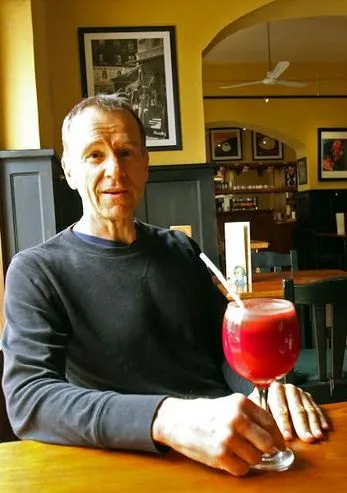An expat pioneer remembers the time when foreigners in Cuenca were considered ‘exotic’
Editor’s note: This is the first of a two-part series about long-time Cuenca expats and the changes they have seen over the years.
By John Keeble
What was Cuenca like before the gringo invasion?
Frank Illing, owner of Wunderbar and Café Austria, can be considered an expert on the subject. He arrived in the city in 1990 and has seen dramatic changes in the 27 years since then.

Frank Illing at Café Austria. (Photo: John Keeble)
When he came to town, foreigners were “something exotic” because there were almost none if them in the city. Local people rarely went out at night, Illing recalls, since there were only a handful of restaurants and bars. There was so little traffic, he says, that there were only two or three traffic lights in the historic district, and motorists could park almost anywhere.
“Life was a lot cheaper then too,” says Illing. “I rented a two-story house, with a garden, for $100 a month — today, that house is a restaurant.”
The growth of the gringo population came on suddenly, Illing says. “About eight years ago, I was walking down Calle Larga when someone handed me a leaflet in English. It said Cuenca was a good place to live. The water was good, the health care was good, everything was good. Within a year or two, a lot of gringos were in town.”
And that was just the start. “More and more foreigners arrived and they all wanted to live in Cuenca,” Illing says. Many chose to live in close proximity in the same areas, he adds, and did not integrate into the local life. They also seemed to frequent the same restaurants, he says, preferring establishments where English was spoken.
The gringo “clustering,” Illing says, has led to residential areas being developed to gringo tastes and increased segregation from the Cuencano population. He adds that language is the major problem and, even today, it is unusual to see mixed events and parties where Ecuadorians and gringos eat and drink together.
Despite the relatively small size of the expat population — perhaps one percent in the overall population according to a recent socioeconomic report — the effect of the English-speaking foreigners has been marked.
Illing, originally from Germany, says there is an upside to the “gringo invasion.” “It has broadened the world view of the local people, and encouraged many of them to learn English,” he says. “Gringo money has energized the economy and stimulated new businesses.”
He adds: “Typically, 20 years ago, people never left the city,” he said. “Now, they do more traveling and have new experiences. The city has become more cosmopolitan. Cuencanos are friendlier and more open-minded about foreign influences. They treat foreigners well. They try to be polite even when language is a problem.”
Today, he sees a vast difference in the city from the day he arrived. “Cuenca was like a big village then, everyone knew everyone,” he says. “When I decided to open Wunderbar 22 years ago, Cuencanos said it was a bad idea because the local people would not go out at night. There was nothing on Calle Larga then and of course today there’s one bar and restaurant after another.”
Fortunately for Illing, the Cuenano advice was wrong and his new business attracted a clientele eager for something to do after dark.
Unfortunately, Illing says, the recent growth in the number of new businesses has not been matched by paying customers. In the past couple of years, he says, businesses has been hard-hit by the down-trending Ecuadorian economy and many have not survived.
There’s one thing that hasn’t changed for Illing. Wunderbar and Cafe Austria, which he bought 14 years ago, continue to welcome both expats and Ecuadorians. “I’m very pleased that my businesses are places where different people mix, meet to chat and drink coffee, play chess, work on their laptops, and eat,” he says. “I feel like I play an important role in a changing city.”




















